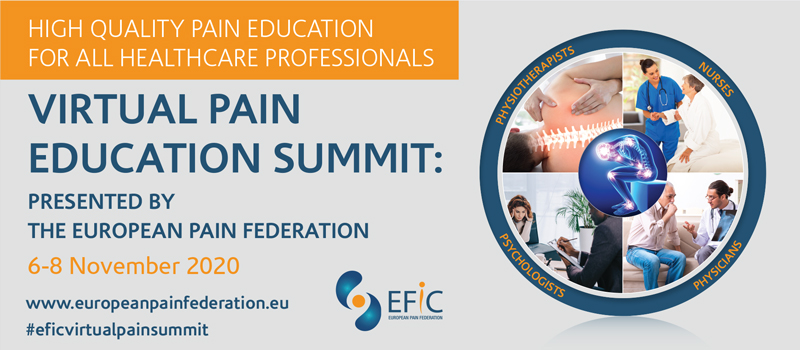Interested in taking part in the biggest online pain education event of 2020? Our Virtual Pain Education Summit on 6-8 November 2020 is fast approaching. Over 40 hours of teaching across 3 days within four specific educational tracks (Pain medicine, Physiotherapy, Psychology and Nursing) along with interprofessional sessions and topical lectures on hot topics in pain science make this virtual summit an exciting opportunity for all healthcare professionals.
Why attend the pain medicine track?
Prof Bart Morlion, Summit co-chair and head of pain medicine sessions, says: “You will have pre-digested information, updated information in very short contributions of many experts in the field.” This will include updates on chronic widespread pain, neuropathic pain, opioids and chronic non-cancer pain, and interventional pain management. Professor Morlion added: “Although we will have many sessions, with many different lecturers, there will be space and room enough to interact.”
Why attend the physiotherapy track?
Professor Harriet Wittink, head of physiotherapy sessions, encourages physiotherapists to attend as they “will be able to improve their abilities to care for people dealing with pain.” This will be facilitated through updates including complex and multidimensional nature of pain and principles of contemporary assessment, treatment, and communication. Professor Wittink also reminds physiotherapists that “The Summit offers evidence-based information to help you prefer for the EDPP (European Pain Federation Diploma in Pain Physiotherapy).”
Why attend the psychology track?
Professor Tamar Pincus, head of psychology sessions believes “for psychologists, the summit offers an opportunity of learning to adapt their skills to specifically target issues relevant to people living with pain.” The track will include updates on neuropsychological factors in chronic pain, social and cultural aspects of pain, and contemporary assessment and treatment including behaviour change and workplace interventions. Professor Pincus added: “For non-psychologists, the summit offers the chance to apply a biopsychosocial model of care.”
Why attend the nursing track?
Professor Emma Briggs, head of the nursing sessions, believes “for those wishing to work towards the European Diploma in Pain Nursing, this programme complements the curricula – it will help people prepare for the exams.” The track will include updates on complex pain management and co-morbidities, pain management in special populations (e.g. cancer survivors, older adults) and contemporary assessment and measurement of pain. Professor Briggs commented on the Summit’s supportive learning environment: “We want to build a network, we want to support and learn each other and this is a brilliant opportunity to do that.”
